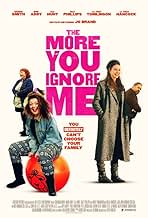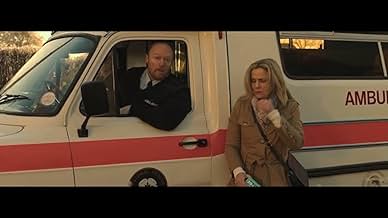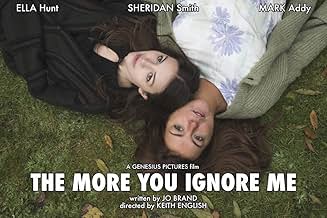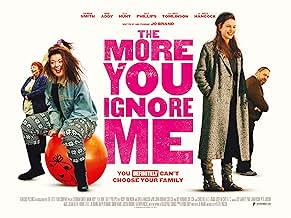Füge eine Handlung in deiner Sprache hinzuSet in 1980's Britain, the mentally ill matriarch of a dysfunctional family finds a plan for happiness with the help of her daughter and friend Morrisey.Set in 1980's Britain, the mentally ill matriarch of a dysfunctional family finds a plan for happiness with the help of her daughter and friend Morrisey.Set in 1980's Britain, the mentally ill matriarch of a dysfunctional family finds a plan for happiness with the help of her daughter and friend Morrisey.
- Auszeichnungen
- 1 wins total
Empfohlene Bewertungen
The performances of all actors was exceptional, mental health very cleverly depicted requiring hours of research. Whilst some of it was amusing, it was not funny and definitely not a comedy. Did not live up to its billing.
Having worked with patients suffering from serious mental health problems for many years I am always interested in how the subject is portrayed on film. The film is set in the seventies and eighties and in terms of options available to people with bipolar disorder (this is essentially what is being portrayed) the options were largely around lithium (which is still used) and old style injectable phenothiazines that patients feel dulls their experience. Although the patient here appears to have bipolar disorder she is treated with injectables which did happen and probably still does. The picture presents the effect of such management well and the picture of someone who is too demotivated to leave their chair, sits smoking for hours and is unreactive is familiar to anyone who would have worked in mental health in the eighties.
I think the beauty of this film is that it is very engaging and very quickly I began to care about the characters. Jo Brand is always very good value and although she has been a writer, actor and comedian for many years the psychiatric nurse is just below the surface and this comes across in the film very well.
Keith English's direction brings one very close to the characters and I think accurately portrays the concerns of families caring for people with mental health difficulties. There are some minutes of high comedy but the tagline of 'you can't choose your family' is very accurate. You really can't choose family members and some of the ones depicted here you really would not want. I did think that the film depicted the concerns of family members well, from their lives being caught up with caring for a relative to the worry about whether they are in some way responsible for their relative's illness (they are not).
The nineteen-eighties are not that far away in time and with no internet, no mobiles and a world in which much of what was happening came through the television it was fun to see how far things have moved on. The over crowded décor of the seventies and eighties - the house being too cold for comfort and the isolation of small communities from urban centres all rang very true to me and although I live near London at the moment I grew up near many such places where a bus coming through was the highlight of the day. Keith English captures this all very well and there is massive attention to detail in making sure the illusion is not shattered.
A warm, kind and gentle film which stirs up some genuine emotions.
Happily for people with bipolar disorder there are better options too and the days of people being either so ill that they need hospitalisation or being overly sedated are now way behind us.
I think the beauty of this film is that it is very engaging and very quickly I began to care about the characters. Jo Brand is always very good value and although she has been a writer, actor and comedian for many years the psychiatric nurse is just below the surface and this comes across in the film very well.
Keith English's direction brings one very close to the characters and I think accurately portrays the concerns of families caring for people with mental health difficulties. There are some minutes of high comedy but the tagline of 'you can't choose your family' is very accurate. You really can't choose family members and some of the ones depicted here you really would not want. I did think that the film depicted the concerns of family members well, from their lives being caught up with caring for a relative to the worry about whether they are in some way responsible for their relative's illness (they are not).
The nineteen-eighties are not that far away in time and with no internet, no mobiles and a world in which much of what was happening came through the television it was fun to see how far things have moved on. The over crowded décor of the seventies and eighties - the house being too cold for comfort and the isolation of small communities from urban centres all rang very true to me and although I live near London at the moment I grew up near many such places where a bus coming through was the highlight of the day. Keith English captures this all very well and there is massive attention to detail in making sure the illusion is not shattered.
A warm, kind and gentle film which stirs up some genuine emotions.
Happily for people with bipolar disorder there are better options too and the days of people being either so ill that they need hospitalisation or being overly sedated are now way behind us.
I'm American and a tad bit obsessed with British films lately so this showed up as recommended for me on a streaming service. It was described as set to "the music of The Smiths" and even the title "The More You Ignore Me" would indicate it's rife with either Morrissey or Smiths music. It's not. They actually only use two songs, This Charming Man and What Difference Does It Make, throughout the entire film so if you're looking for an insane soundtrack, you won't find it here. Also, it's definitely not a comedy. This is a drama with some lighthearted and touching moments that add up to a very sweet and special little movie. It starts with some background of a young girl being raised by both parents, but her mom has an undisclosed severe mental illness that prevents her from being able to parent. Her dad shows a great deal of love and sensitivity to both his wife and daughter and fast forward to the eighties and the girl is now a teenager. She is watching Top of the Pops one night and discovers The Smiths and becomes mildly obsessed with Morrissey. That is more of a sub-story, a thread that weaves throughout the film, but is not the main premise of the story at all. Her mom's illness has clearly worsened over the years, but they are managing and she receives ongoing treatment in the form of a "depo" shot and I assume they mean depakote, but in current times, a "depo" shot is progestin so it's a fertility drug. It was a little confusing. I also find it odd their close family friend and GP named Marie is treating Gina, not a psychiatrist. Again, different times so maybe it's actually not that far-fetched. Anyway, this med essentially turns Gina into a zombie, basically sitting in the den all day long and watching TV, barely able to speak. That is until her daughter convinces Marie to cut her dose in half so her mom comes back to life and surprise - she also becomes obsessed with Morrissey. There is an engaging storyline and get to know most of the main characters to the extent that you care what happens to them. Alice, the daughter, is so charming and such a good actress. She is the big draw for the movie and the primary character. Her mom Gina is more of a supporting role. The one thing I really did enjoy about this movie was the nostalgia of the times. It was very accurate in terms of music, clothing, attitudes... and I'm not British, but seeing that black wool coat with the little white specks and the brooch... we had the same thing and now I want that coat back. I wish they could have incorporated more music. The one thing that did throw me was the scene where we get a glimpse of Gina's arm and she has a giant tattoo. They should have covered that up with makeup. No suburban housewife or mom back then would have had a giant tattoo on her arm or anywhere else. It was like being jolted back into reality for a moment. I love seeing how close knit and stable their family was despite the mom's severe illness. However, do I think the acting was overdone to depict this unknown "mental disorder"? Absolutely yes. It became too forced. Like a farce. There are moments when it is very realistic and heartbreaking, and other moments where she reverts to this "child-like" persona that is NOT an indicator of either schizophrenia or bipolar disorder so I'm not entirely sure what that is supposed to be. A mental illness does not equal intellectual disability. It's actually a bit stigmatizing and wish they had gone a different direction with that portrayal of the mom's illness. Bottom line, love, love, the dad and daughter relationship, and the story overall. It was an entertaining movie and worth watching if you're a teen of the 80s, whether you like The Smiths or not.
Brilliant British production in every respect. It is in a genre of its own (certainly not a comedy) and a heart warming depiction of mental illness. Doesn't sound interesting or entertaining but give it a chance and you will be delightfully surprised. Out of the ordinary, moving and tearful at times, it is a great story of human emotions, understanding and tenderness. Written by the comedian Jo Brand, the casting and acting are excellent. Enjoy!
Wusstest du schon
- WissenswertesFirst feature film written by Jo Brand
Top-Auswahl
Melde dich zum Bewerten an und greife auf die Watchlist für personalisierte Empfehlungen zu.
- How long is The More You Ignore Me?Powered by Alexa
Details
- Erscheinungsdatum
- Herkunftsland
- Offizielle Standorte
- Sprache
- Auch bekannt als
- Чем больше ты меня игнорируешь
- Drehorte
- Produktionsfirma
- Weitere beteiligte Unternehmen bei IMDbPro anzeigen
Box Office
- Weltweiter Bruttoertrag
- 212.498 $
- Laufzeit1 Stunde 30 Minuten
- Farbe
- Seitenverhältnis
- 2.35 : 1
Zu dieser Seite beitragen
Bearbeitung vorschlagen oder fehlenden Inhalt hinzufügen

Oberste Lücke
By what name was The More You Ignore Me (2018) officially released in India in English?
Antwort




































